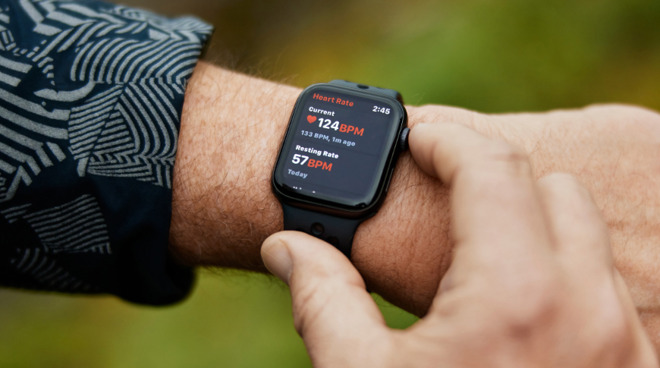Apple Watch anniversary gift saves runner's life
Apple has recounted how the present of an Apple Watch led to a man discovering a serious heart condition in time to seek emergency treatment.

Apple Watch
Apple receives countless reports of how the Apple Watch has saved lives, from early warnings about heart problems, to calling emergency services from a flood. The latest also sees an early warning, but this time for a man who wouldn't have got an Apple Watch if it weren't for his partner.
In September 2020, recounts Apple in a news release, Lori March gave her husband Bob an Apple Watch for their 17th wedding anniversary. She told him that "an investment in your health is an investment in our future."
Bob March was previously a college-level athlete who more recently ran half marathons. So when Apple Watch immediately told him his heart rate was 127 beats per minute, he says, "I thought, 'this is nuts'."
Late when he was running, the heart rate reading started fluctuating. "So that's when I realized something may not be right here," he says. The couple went to a doctor for a physical.
"I figured the doctor would tell me to practice breathing, try yoga, cut back on sodium or something of that sort," says Bob March. "Instead, 10 minutes after meeting with me, he had me in an ambulance headed to the ER."
An arrhythmia had been detected, which was straining his heart as if he had been running constant marathons -- even though Bob felt fine all the time. Without the Watch, he would not have thought to see a specialist.
Bob March had an operation on October 19, 2020, and is reportedly now back to running.
"We truly believe that it saved his life," Lori March told Apple. "It doesn't get any bigger than that."
Heart rate detection is one of the many Apple Health features of Apple Watch, and Apple is continuing to add them.

Apple Watch
Apple receives countless reports of how the Apple Watch has saved lives, from early warnings about heart problems, to calling emergency services from a flood. The latest also sees an early warning, but this time for a man who wouldn't have got an Apple Watch if it weren't for his partner.
In September 2020, recounts Apple in a news release, Lori March gave her husband Bob an Apple Watch for their 17th wedding anniversary. She told him that "an investment in your health is an investment in our future."
Bob March was previously a college-level athlete who more recently ran half marathons. So when Apple Watch immediately told him his heart rate was 127 beats per minute, he says, "I thought, 'this is nuts'."
Late when he was running, the heart rate reading started fluctuating. "So that's when I realized something may not be right here," he says. The couple went to a doctor for a physical.
"I figured the doctor would tell me to practice breathing, try yoga, cut back on sodium or something of that sort," says Bob March. "Instead, 10 minutes after meeting with me, he had me in an ambulance headed to the ER."
An arrhythmia had been detected, which was straining his heart as if he had been running constant marathons -- even though Bob felt fine all the time. Without the Watch, he would not have thought to see a specialist.
Bob March had an operation on October 19, 2020, and is reportedly now back to running.
"We truly believe that it saved his life," Lori March told Apple. "It doesn't get any bigger than that."
Heart rate detection is one of the many Apple Health features of Apple Watch, and Apple is continuing to add them.


Comments
The racing kept happening It kept appearing so I bought the Apple Watch to monitor what was going on. The watch confirmed a suspicion and I saw it peak around 150bps, I saw a Dr, he put me on to beta blockers then I had an ablation surgery a couple months later.
These watches literally save lives for a few hundred dollars.